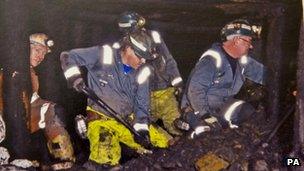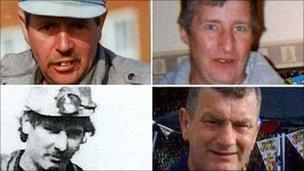Prince Charles meet Gleision Colliery rescue teams
- Published
The Prince of Wales has met some of those involved in attempts to rescue four miners who died when a Swansea Valley pit flooded in September.
Prince Charles met rescue teams, emergency services and others who responded to the Gleision tragedy.
He is patron of an appeal fund for the families, which has so far raised £750,000.
The mineworkers' union NUM said the prince had shown an "immediate and sincere interest" in the events.
David Powell, 50, Charles Breslin, 62, Philip Hill, 44, and Garry Jenkins, 39, lost their lives in the disaster.
A major rescue operation was launched when the drift mine flooded on 15 September.
Initially it was hoped the men would be found alive and during the operation their families gathered at the Rhos Community Centre near Pontardawe to wait for information.
Rescuers worked through the night to try to reach them but their bodies were recovered the following day.
About 200 people gathered at Rhos Community Centre for the prince's visit on Friday afternoon and the local school closed early.
They greeted him as he embarked on a walkabout after he arrived by helicopter in a field next to the community centre.
'Like a tsunami'
He then met the rescuers inside the centre before speaking to the families of the miners in private.
One of the rescuers, Huw Jones, described to the prince what had happened during the rescue attempt, showing him a map of the mine and photographs taken at the scene.

This picture seen by the Prince shows the rescue operation underground at Gleision Colliery
Mr Jones, who was a friend of Mr Jenkins, said rescuers had waded through thick sludge hoping to access areas where the miners might have taken refuge.
"We cleared a hell of a lot of water and everyone worked together very well," he said.
"It was not until we heard that the last person had been found dead that you realised how tired you were."
He said that early in the rescue his team had been driven on by a tapping noise which they had hoped was being made by a survivor.
That hope eventually proved groundless but all the men were eventually found close to areas where, with different circumstances, they could have survived.
In the end the force of the water which raced through the tunnel where they were working had an immediate and devastating effect.
Mr Jones, pointing to a section of tunnel on the map, said: "It would have been like a tsunami. They had no chance whatsoever. They would have been washed away."
Private donation
An appeal fund was set up following the tragedy to help the men's families and the three survivors of the tragedy, with Prince Charles as its patron.
Peter Hain, Labour MP for Neath, also a patron of the appeal fund, spoke of the prince's eagerness to help in the aftermath of the disaster.
He added that Prince Charles had given a substantial private donation to the fund himself.
Wayne Thomas, general secretary of the National Union of Mineworkers (NUM) in South Wales, said many in the community appreciated the prince's support.

The four men died when the mine flooded on 15 September
"Prince Charles showed an immediate and sincere interest in these horrendous and devastating events," said Mr Thomas.
"He is of course patron of the appeal and his visit is evidence of how sincere he is about that."
The fund is around £750,000, according to the Coal Industry Social Welfare Organisation (Ciswo), which has now taken over the running of the appeal.
This includes Welsh Secretary Cheryl Gillan's pledge of a 25% equivalent gift aid on contributions.
Mr Thomas added: "Money is still coming in and there are still a lot of events taking place. The response has been phenomenal.
"I don't think anyone involved with this appeal ever envisaged that much support would come forward."
The Coal Industry Social Welfare Organisation (Ciswo) has now taken over the running of the appeal fund, which it says has reached about £750,000.
Next Friday a memorial service will be held in Pontardawe for the four miners as well as five-year-old schoolboy Harry Patterson.
He died following an accident on the drive of his house, near Pontardawe, two days before the mine tragedy.
- Published16 November 2011
- Published17 October 2011
- Published12 October 2011
- Published23 September 2011
- Published19 September 2011
- Published19 September 2011
- Published16 September 2011